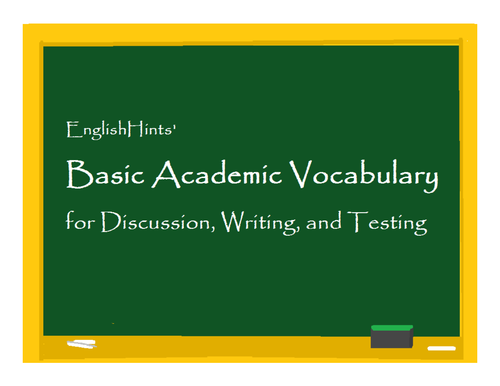
Teach the basic academic vocabulary needed to understand test instructions, writing prompts, and academic discussions. In these six or seven lessons, students read and practice the words in multiple ways including by proofreading an essay, completing task cards and a crossword, and choosing the best thesis statements for suggested essays.
It’s important for English Language Learners to fully understand the words used in writing instructions and test prompts so that they know what they are expected to do. Understanding basic academic vocabulary will also help reading comprehension and class participation.
These lessons offer several ways to differentiate instruction, so that several of them (especially on essay writing and proofreading) will work for classes with native speakers as well as English learners.
The lessons in this packet show the ways about 30 important verbs (and related nouns and adjectives, as well as a few lone nouns or adjectives) can be used. The words appear first in short texts about essay writing. They are practiced multiple times in example essays, task cards, and a crossword so students can see them in different contexts, use them themselves, and have a chance to really acquire them.
Key vocabulary, mainly in order of use in essays and task cards: analyze (including analysis and analytical), conclude/ conclusion, determine (etc.), evaluate, identify, interpret, predict (all from the Scientific Method essay, as well as bias, evidence, and valid from its glossary– not on cards).
The most basic verbs for instructions, in “Sharing Ideas”: demonstrate, explain, illustrate, describe, respond, integrate, develop (and in comparison essay) compare, contrast, similar, distinguish.
Essay Organization: organize, consequence, significance, persuade, argue, support, oppose, thesis, specific, transition, summarize, (and from Transitions practice: access), then imagine, imply (and related practice with infer), and transform from the essay on Consequences/Proofreading practice.)
These lessons can help ELLs ease into essay writing, with some explanation of what is expected in an essay in English, then several example essays, practice with transition words and proofreading, before they need to write themselves.
It’s important for English Language Learners to fully understand the words used in writing instructions and test prompts so that they know what they are expected to do. Understanding basic academic vocabulary will also help reading comprehension and class participation.
These lessons offer several ways to differentiate instruction, so that several of them (especially on essay writing and proofreading) will work for classes with native speakers as well as English learners.
The lessons in this packet show the ways about 30 important verbs (and related nouns and adjectives, as well as a few lone nouns or adjectives) can be used. The words appear first in short texts about essay writing. They are practiced multiple times in example essays, task cards, and a crossword so students can see them in different contexts, use them themselves, and have a chance to really acquire them.
Key vocabulary, mainly in order of use in essays and task cards: analyze (including analysis and analytical), conclude/ conclusion, determine (etc.), evaluate, identify, interpret, predict (all from the Scientific Method essay, as well as bias, evidence, and valid from its glossary– not on cards).
The most basic verbs for instructions, in “Sharing Ideas”: demonstrate, explain, illustrate, describe, respond, integrate, develop (and in comparison essay) compare, contrast, similar, distinguish.
Essay Organization: organize, consequence, significance, persuade, argue, support, oppose, thesis, specific, transition, summarize, (and from Transitions practice: access), then imagine, imply (and related practice with infer), and transform from the essay on Consequences/Proofreading practice.)
These lessons can help ELLs ease into essay writing, with some explanation of what is expected in an essay in English, then several example essays, practice with transition words and proofreading, before they need to write themselves.
Something went wrong, please try again later.
This resource hasn't been reviewed yet
To ensure quality for our reviews, only customers who have purchased this resource can review it
Report this resourceto let us know if it violates our terms and conditions.
Our customer service team will review your report and will be in touch.
£9.50
